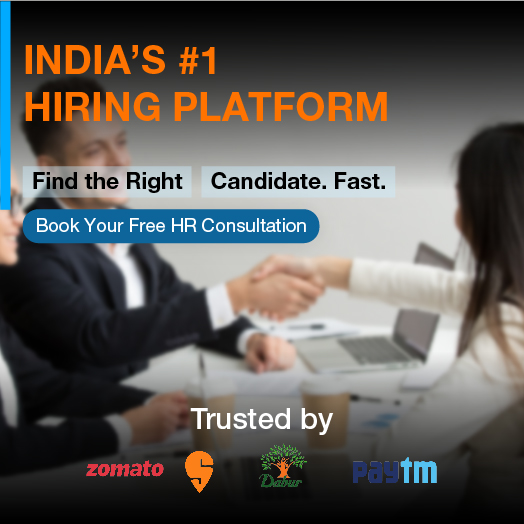
Staffing – Definition, Staffing Process, Steps and Benefits
- Our Subject Matter Experts
- March 13, 2025

What is Staffing?
For bigger and smaller corporations, staffing is considered a tedious job. To make the process easier, companies are resorting to recruitment agencies for help.
When hiring or building a team, qualifications should meet industry standards and add substantial value to the organization. Hiring is all about ensuring the workplace has the right number of qualified and motivated people. It helps create a positive work environment where everyone can do their best work and stay motivated. For a company, one must remember that the workforce is fully equipped. Remember, Skilled employees can accelerate organizational growth.
Whether you are a startup or an established organization, Staffing can challenge your day-to-day work schedule. You need people to work for you, but your new setup may need to be in the way of hiring the right candidates, or your HR bandwidth needs to be fuller to do the Staffing for you. In such instances, temporary staffing companies are a final resort. With the help of these companies, you can meet the requirements of your employees to run your organization seamlessly.
There are various types of Staffing services one can avail of. Such as:
• Contract Staffing
In Contract staffing, an employee is hired for a trial period of time. In Contract staffing, organisations experiment with various employees at the time to hire period to find the perfect employee for a role. In contract staffing, the employees decide to extend or not extend the contract, after careful evaluation of the employee’s skills
• Permanent staffing or Long term staffing
When the organisation requires a staff for more than a year, it is permanent staffing. Look term or Permanent hiring is strategic. Permanent Staffing includes building a skilled, stable workforce that helps the organisation move forward.
• Temporary Staffing or Short term staffing
In Temporary staffing, hiring is done to fulfil immediate business requirements. An organisation may hire extra workers on a seasonal or need basis. Companies often hire temporary workers for a short period to fulfil certain orders or for specific projects. Apart from temporary administrative positions, short-term staffing may also include creative positions where they hire freelancers.
4 Important Functions of Staffing
1. Meet short-term staffing problem
At times, no matter how many employees you have for doing a job doesn’t matter. You get an ad-hoc request for bringing in more people for the task. In such a situation, you need staff that can work for a few months and may be under contract. Employees are not comfortable working in the short term. This is when a temporary staffing company comes to your rescue.
2. Meet long-term staffing problem
Your HR professionals may be on leave, and your professionals hiring employees may be attending to other important tasks at hand. These are two reasons why you feel the need of finding someone experienced in doing the job of hiring for you. Who can do it better than a temp staffing company? They are experienced and well-equipped with the process.
3. Negotiating on behalf of you
After you have a discussion with the temp staffing company, they do the part of negotiating the salary for the candidates. It is a part that most companies face a challenge with. These temp staffing companies know their job well and can accomplish what’s needed out of them. Without much hassle, your stress of getting the right candidate within your budget is resolved.
4. Save training cost
The market’s best temporary staffing companies have a pool of candidates waiting to join an organization. The one candidate you are looking for is under their radar. Once you have set the expectations of the skills of a candidate, they will give you the right fit. Trusting a company like this can save you tons of money that would go into training the candidates for a month or two.
Efficient Staffing Process contribute to organizational success by ensuring a competent and motivated workforce that can adapt to changing demands. A well-executed functions of staffing leads to improved productivity, employee satisfaction, and ultimately, achievement of strategic objectives.
Meeting the industry-specific requirements will need the deployment of highly skilled professionals and industrial staffing solutions to increase the workforce productivity and these services are provided to different industries through robust in-house technology and its best HR solutions that take care of the entire package:
• Kiosk-based Login Facility
• Onboarding and KYC
• Attendance Management
• Employee lifecycle management
• Productivity Solutions
• Training and Skilling Solutions
• Payroll and Compliances Management
• Exit Management
YOMA, ensures all of this is taken care of efficiently and smoothly.
What are the Characteristics of Staffing?
Staffing keeps things in order. Staffing agencies make an effort to find high-quality employees. It’s all about – hiring and managing only the best.
In this ever-changing world, Staffing is the go-to guy, adapting to what the company needs and what’s happening outside. It’s not just about filling spots; it’s about being smart, understanding what the market wants, embracing new tech, and handling changes inside the company. Staffing is the hero that makes sure our team grows and changes just like we do.
Staffing is like our forward thinker, not just reacting to problems but planning. In simple language, Staffing is the backbone, the brain, and the strategy behind why organizations work well. It is the secret ingredient behind organizational success.
The staffing Process includes a constant effort to manage and optimize employees. It is multifaceted and people-centric. It emphasizes recruitment and effective management of human resources.
In addition to prioritizing the employees’ needs, Staffing also works to impart training. By constantly providing a space for improvement, they make sure the employees discover their full potential. Staffing processes involve a lot of exposure to gain new skills.
Staffing is crucial because it adjusts to changes in a company and the world around it. It responds to market shifts, technology changes, and internal restructuring. Staffing ensures that the workforce matches the organization’s evolving needs. It directly impacts achieving organizational goals. Having the right people with the right skills is vital for success. Staffing isn’t just reacting to changes; it’s a proactive strategy for shaping the workforce to handle present and future challenges.
What are the Steps in Staffing?
We go through the steps of Staffing Process to ensure it’s efficient and works well. The first step is workforce planning, where we assess current and future workforce needs based on the organization’s goals. Then comes recruitment planning, where we set goals, decide on sources and budget, and create a timeline for hiring. Job analysis and design follow, involving a detailed look at roles, responsibilities, and skills needed. This analysis forms the basis for effective recruitment process and selection. Lastly, we source and attract candidates through various channels like job boards and social media, aiming to showcase the organization’s culture and values.
1. Manpower Planning:
Workforce planning is about assessing current and future workforce needs. It is the first and most important aspect of Staffing:
- The entire staff demand is critically considered.
- The workload is also evaluated.
- After the plan is set, HR moves on to the next step: Hiring.
2. Recruitment Planning:
Recruitment or hiring of staff needs to be very strategic and job-specific. In this phase, the job role is defined, and then goals are set, after which recruitment is carried out via different platforms.
3. Job Analysis and Design:
Examining a job role is of utmost importance. With a clear definition of skills and qualifications, finding the right candidate can get easier.
Knowing the details of a job well is crucial for hiring the right people successfully.
4. Recruitment
Recruitment is the process of seeking potential employees and motivating them to apply to work for the organization. It is the process of seeking applicants from various sources, including:
- Job postings on job boards, company websites, and social media.
- Employee referrals and recruitment agencies.
- Creating compelling job descriptions to attract the right talent.
5. Selection
Selection is the process of excluding those who look unpromising. The selection process intends to determine whether a candidate can be employed by the organization or not. Thus, the principal objective of the selection process is to select the correct candidates to work in different positions within the organization. A well-prepared selection process is essential.
- Resume screening and first-round interviews.
- Skill tests and behavioral tests.
- Last-round interviews and hiring based on organizational fit and merit.
6. Placement
Placement involves appointing the individual to the job for which they are chosen. After a person is selected, the second step is the placement of the person in the organization:
- According to expertise and job requirements, assigning roles.
- Aligning the employee’s capabilities with organizational needs.
- Guaranteeing a seamless onboarding process for integration.
7. Training
After selecting an employee, the program’s critical part is to train the new employee. Training is essential for employees to adapt to their roles effectively:
- Providing orientation programs for new hires.
- Conducting skill enhancement workshops and technical training.
- Continuous learning initiatives to improve performance.
8. Promotion
Promotion is the process of advancing an employee to a superior position with increasing rank, prestige, and responsibilities. Promotion is a key motivator in career development:
- Based on performance, experience, and skill enhancement.
- Encourages employee retention and engagement.
- Aligns with succession planning and leadership development.
9. Transfer
Transfer means the movement of an employee from one job to another without an increment in pay, status, or responsibilities. It is:
- Based on business needs or employee preferences.
- It can be horizontal (same level) or vertical (higher responsibility).
- It helps in employee skill diversification and job enrichment.
10. Appraisal
Appraisal of employees regarding how effectively the subordinate is executing a job and also to understand their aptitudes and other qualities required for executing the job allotted to them. Employee performance appraisal is conducted periodically to evaluate efficiency and productivity:
- Setting performance goals and reviewing achievements.
- Feedback sessions for improvement and development.
- Rewarding high performers through incentives or recognition programs.
11. Determination of Remuneration
This final process is quite important since it entails setting remuneration, which is one of the most challenging activities of the personnel department since there are no clear or specific methods to set the proper wages. Pay is a key component of employee satisfaction and retention:
- Salaries and benefits are determined based on industry standards.
- Performance-based bonuses and incentives are included.
- Ensuring equity and transparency in remuneration policies.
The Benefits of Hiring Staffing Recruiters
Everyone who strives to advance in the corporate sector requires staffing recruiters who can take on additional responsibilities and deliver on time.
Many discrepancies might arise during the development of an organization. Any work environment’s production, efficiency, and effectiveness are all determined by the people you hire. By providing you with well-equipped industrial personnel, Human Resource Outsourcing can assist you in assessing the performance and progress of your firm.
1. It is cost saving
Companies may feel that utilizing the services of a recruitment agency will be more costly. It is, however, even less expensive than doing it yourself.
A staffing agency can save the company money by minimizing the cost of recruiting a new employee while starting a new project. Recruiters will be in charge of the new team. They even give you prescreened CVs, saving you money on the cost of posting your job on many job portals.
2. Staffing recruiters are moving at a faster pace.
It takes a lot of work to complete all of the openings quickly; some profiles could take up to two months to fill. A recruiting business, on the other hand, has a vast database, knowledgeable staff, and cutting-edge software that may expedite the hiring process and provide satisfactory candidates quickly.
3. Hire only the most qualified and thoroughly screened employees.
Using a recruitment service that specializes in industrial Staffing will make the hiring process go more smoothly and quickly.
They’ll do all of the legwork for you, prescreening candidates and presenting profiles that are a suitable fit for your needs.
4. You won’t have to deal with any more compliance issues.
Employee benefits, payroll outsourcing , taxes, and insurance are all handled by agencies, and they keep up with changing employment requirements to ensure that firms are aware of the situation.
5. Hire versatile and flexible employees
Businesses frequently seek seasonal or one-time employees since contractual or temporary workers are hard to come by. A general staffing agency can help you handle your problem by giving you greater flexibility and avoiding long-term commitments.
Staffing Made Simple
Simplify your staffing strategy with our expert staffing solution.
Conclusion
In conclusion, Staffing is a critical management function that encompasses the entire lifecycle of acquiring, developing, and managing an organization’s workforce. It involves strategic planning, recruitment, selection, training, and ongoing development to ensure that the right people with the right skills are in the right positions to meet organizational goals.
The types of Staffing, including permanent, temporary or seasonal, and contract staffing, provide organizations with flexibility in addressing varying workforce needs. Each type serves specific purposes, contributing to workforce agility and adaptability.
Characterized by its continuous and dynamic nature, Staffing is a people-centric process, recognizing the significance of skilled and specialized individuals in contributing to organizational success. The interconnectedness of staffing processes ensures strategic alignment, builds a talent pipeline, and fosters continuous improvement within the workforce.
The overall impact of an efficient staffing process is profound, leading to improved productivity, employee satisfaction, and the achievement of strategic objectives. Meeting industry-specific requirements often requires specialized staffing solutions, and industrial staffing agencies play a crucial role in providing skilled professionals for various projects.
Additionally, outsourcing staffing services to recruiting agencies brings cost-effectiveness, faster hiring process, access to qualified candidates, and relief from compliance issues. The versatility and flexibility offered by staffing agencies address the evolving needs of businesses, allowing them to navigate workforce challenges with ease.
In a competitive and challenging business environment, effective Staffing is not just a reactive process but a proactive strategy that shapes the workforce to meet current and future demands. It is a key determinant of overall organizational effectiveness and competitiveness, ensuring that businesses have the right talent to thrive and succeed.
FAQs
What are the features of staffing?
Staffing is characterized by its ongoing and multifaceted nature, emphasizing the importance of effective workforce management. It involves various steps like recruitment, selection, training, and development
The staffing process is people-centric, recognizing that employees are the lifeblood of an organisation. The nature of staffing allows for organizational growth and the external environment, ensuring the workforce is aligned with evolving requirements.
What is the importance of the staffing process in management?
The staffing process is crucial for the overall effectiveness of workforce management. It ensures strategic alignment by recognizing and addressing current and future manpower needs. The interconnectedness of staffing processes, such as recruitment, selection, and training, contributes to building a competent and motivated workforce.
Why does the manager or the head of the human resource department need to follow formal staffing techniques?
Managers or heads of the human resource department need to follow formal staffing techniques to ensure a systematic and strategic approach to workforce management. These techniques involve steps such as manpower planning, recruitment process, job analysis and design, sourcing and attracting candidates, screening and selection, placement and orientation, training and development, performance appraisal, and compensation and benefits. Following formal techniques helps in aligning staffing with organizational goals and adapting to changes in the business environment.
Mention some of the objectives and steps involved in staffing?
Some objectives of Staffing are:
Alignment of workforce with organizational goals and training and development.
The steps involved are Planning, hiring, Training and onboarding.
What does performance appraisal, compensation, promotion, and transfer mean in staffing?
Performance appraisal involves assessing employees' job performance against established criteria.Compensation and Benefits involves decisions related to salary structures, bonuses, and other benefits to remain competitive in the job market.
Staffing processes include considerations for employee promotion based on performance appraisal results.







